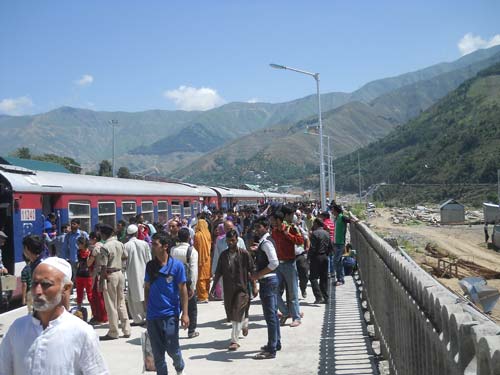It took almost a century to realize Kashmir’s rail dream. But once it was done a small town along the new rail link is waking up to new business avenues. Junaid Nabi Bazaz travels to the hilly town of Banihal to gauge the change.
In 2005 when the central government started acquiring land for the railway line, residents of Banihal of district Ramban were reluctant to sell their land. But when government promised a substantial amount for their land and a government job, some villagers willingly signed the deal. Many however did not.
Seven years after when the railway link connecting Banihal with Baramulla became operative, the villagers say the promises are yet to be fulfilled. Neither the government job nor the promised amount came their way. In fact they were forced to sell their land at throw away prices allege the villagers.
Abdul Qudos, lamberdar of the Kuskot village provided his 15 kanals of land to the railways. His brother’ gave 20 kanals. “For our land they even paid less than the rates fixed by government at that time,” says Qudos.
According to the officials, the government rate for the irrigated land was four lakh per kanal, but the villagers say they were paid just Rs 172500. For un-irrigated and the uncultivable land, the rate was fixed at Rs 2.5 lakh and Rs 75000 respectively but again the villagers were just paid a meager sum of Rs 85000 and Rs 10000.
The natives of the area even protested against the ‘alleged’ cheating and presented their case to every concerned authority but nothing happened. “They only made promises with us,” says Qudos.
Now after the train has found its track, the land prices in the area have skyroketted. Land measuring one kanal as per government fixed rates is worth Rs ten lakh but Qudos alleges no one is ready to sell the land even at whooping Rs 15 lakh.
“Our loss is immeasurable,” says Qudos.
Qazigund Banihal railway line was recently inaugrated by Prime Minister Manmohan Singh. The link has to its credit the second longest tunnel constructed at the cost of Rs 1,6291 crore. It will reduce the distance between Banihal and Qazigund by half — from 35 km by road to 17.5 km by train. The train has brought respite for the people especially students and employees. Mohammad Khalid, who studies at Kashmir University, resided in the university hostel until railway was started. Now he goes home every day by train.
With no degree college for a population of around one lakh, students from Banihal have to move to other places to pursue higher studies. Only recently a degree college has been sanctioned that is under construction right now.
The literacy rate of district Ramban is 56.9% with 65256 students on rolls at different educational levels, with a major chunk coming from Banihal. With the start of railway, experts say that the literacy rate of the district will increase substantially in the coming years.
“Having paucity of avenues and higher institution is one of the reasons why Ramban has low literacy rate. Railway can now help people to move easily out for higher studies at an affordable fare and in less time,” says Mohammad Yasin, a higher secondary lecture from Banihal.
Banihal is fast emerging as a transit point between Jammu and Srinagar which certainly will provide a fillip to the local economy. People of Banihal are quite hopeful that the enhanced business activity in the district will create employment opportunities for the local youth.
“If it happens in a proper direction, it will completely change the demography of the region,” says Feroz Ahmad, owner of a hotel and two restaurants in Banihal.
In the days of inception, the influx of the passengers has remained high. Assistant Station Manager at Banihal Railway station, Rahul Rai says that on an average 3000 to 3500 passengers travel every day by train from Srinagar to Banihal.
“So far the highest number is 4500,” he said. “Currently these are locals from different parts of Kashmir who visit, but once it catches up the number will be more.”

















keeping in view occupation of Jammu and Kashmir by Endian establishment, only economic aspect cannot be touched; the impact on culture and ethos of Banihal in particular and Kashmir in general should also have been included. the conversion of agricultural land that is the most important factor of Kashmir to be independent is now being made dependent more on imports………………..much more!!!!!